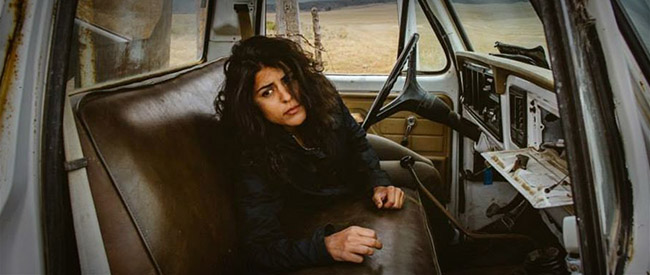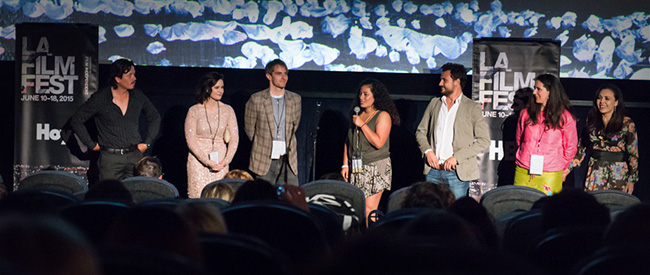‘Hostile Border’ Filmmakers Critique the American Dream
It’s only April, but 2016 is already congealing into one of the most contentious (and totally discordant) election cycles in American history. And unfortunately, there’s no shortage of divisive political issues designed to split the electorate into warring cliques of red and blue—not least of which is the US-Mexico border.
Border politics, immigration and identity are just three of the issues propelling the action in director/cinematographer Michael Dwyer and writer/co-director Kaitlin McLaughlin’s tense new indie thriller Hostile Border. But really, Dwyer and McLaughlin’s dark, stylish tale of one young deportee’s dangerous journey across the border and (maybe) back again is about one thing and one thing only: the American Dream.
Hostile Border premiered at the 2015 LA Film Festival under the title POCHA, eventually winning the Festival’s Audience Award for Best Narrative Feature. Nearly a year and one title change later, the movie is finally in theaters.
McLaughin is a Film Independent Screenwriting Fellow, and is currently working her way through the labs yet again with her newest project, the Irish family comedy-drama, The Murphys.
Film Independent recently spoke to Dwyer and McLaughlin about Hostile Border, the tension of being caught in-between cultures, the benefits of making genre films, differing gender perspectives in storytelling and more.
Tell me a little bit about Hostile Border—what’s it about?
Dwyer: Sure! The film is about a young woman who gets busted in a credit card scheme and is deported to Mexico, where she’s forced to reunite with her estranged father. She doesn’t really feel at home, so in an attempt to get back to the U.S. she gets mixed up with a dangerous smuggler, which leads to a lot of danger, as well as ultimately learning some hard lessons about the price of the American dream.
What was the inspiration behind the story?
Dwyer: I was actually crossing the border late one night and ended up witnessing the midnight deportation of some young guys—of all ages, really. And basically I ended up standing in line with them while I was getting some of my own immigration paperwork handled. Talking to them, I was seeing that several of them were completely Americanized and didn’t really know anything about Mexico. Several of them didn’t even speak Spanish. It really captured a sort of in-between feeling, and I’d been looking to tell a story about the border and identities at the border—witnessing that deportation was really the beginning of that.
You mention that it was young men involved in this deportation. How did that initial kernel of an idea evolve into a story about a female protagonist?
McLaughlin: Michael and I had been developing another feature that we were going to make, and he shared some of these stories with me. He’d actually written another script sort of delving into some of these themes, and I actually went down and spent some time in Mexico near where he lived—you just sort of see all these vast landscapes and ranches. We began to naturally discuss making a movie, and I really wanted to tell it from a female perspective. We discussed it as a Western, which have always critiqued American values. It seemed like an interesting opportunity to position the film from a woman’s perspective. She [Claudia] is determined to not be a victim, and is motivated in some ways by obtaining wealth and materialism. So we were really interested in focusing in on a strong, adaptable young protagonist, who happened to be female, and who was going to be forced to interrogate some of her values and what it really meant to be an American.

Did coming to this milieu as outsiders help inform the idea that Claudia herself feels disconnected from her Mexican identity?
Dwyer: I guess I’d say yes. Neither [Kaitlin or I] are Hispanic, but I definitely feel like I’ve definitely grown up around the border, and am steeped in the various identities that exist under the shadow of the border. I think what we ultimately wanted to tell a story about was American identity and the American dream, and I think [the film] is really about Claudia’s relationship to those two things.
The film is a thriller, and you mentioned drawing inspiration from Westerns. Why did you approach this material in a genre film, as opposed to a drama?
Dwyer: I’d developed an earlier version that was more of a character-driven, experimental-type thing. What I really wanted to capture was this tension of being caught in-between; the tension of being caught between two languages and two cultures and different moral codes and all of that, that’s really about tension and suspense and the fact that this experience has a true feeling of risk.
McLaughlin: For us, the movie does really straddle two genres. It’s a Western and it’s a thriller. The film is about being caught in-between, so I think that there’s this narrative friction of genres fighting it out. I think you can see that in the movie.
How political did you intend this film to be, and how political do you think it actually is, arriving in the middle of the 2016 election cycle?
Dwyer: That’s a great question. I think that ultimately it’s hard to gauge how political [the film] is, because I think we do a good job of making it about Claudia’s character and her personal choices, and that’s something particular to her. There’s not a huge political message behind those things. But that being said, we do have our perspective on the state of the American dream. The thing I’ve seen that both Bernie Sanders supporters and Donald Trump supporters agree on is that the American dream is no longer alive today. I think this film speaks to that.
I think it’s true that in genre films you can often Trojan horse in a political message more effectively for a broad audience.
McLaughlin: We definitely used the words “Trojan horse” when we were writing, for sure. Obviously we do wade into the immigration issue, but for us the movie is very much about how dangerous greed is.

Can you describe the experience of winning the Audience Award at last year’s LA Film Festival?
Dwyer: I actually had to work on the day of the ceremony, so I wasn’t there and I got the information second hand. I don’t know that I’ve ever been so surprised! We’d been flirting with sales agents and buyers, but then [after the win] we had a much higher degree of traction. It’s been instrumental in our success and having a much wider release.
McLaughlin: Our experience at the LA Film Festival was fantastic. It was completely the experience you dream of. We’d already had the experience of interacting with the audience and it felt so great that we were able to make a movie that so many people saw. To have Film Independent’s support to get to that point was amazing. It felt like we’d been living in a thriller, because the stakes are so high and you feel like your life in on the line. Then all of a sudden you’re in, like, a romantic comedy. The shift was so extreme. You think people are pursuing you, but really they’re just trying to throw you a surprise party.
For more information about Hostile Border please visit the film’s website or IMBD page. And learn more about the LA Film Festival by clicking here.
To learn more about Film Independent subscribe to our YouTube channel. You can catch up with the rest of our blog here. To learn how to become a Member of Film Independent, click here.